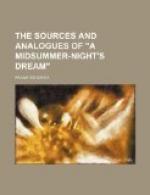ROBIN GOOD-FELLOW 81
THOMAS OF ERCELDOUNE 122
SCOT’S DISCOVERY OF WITCHCRAFT 133
‘STRANGE FARLIES’ 141
THE MAD MERRY PRANKS OF ROBIN 144
QUEEN MAB 149
THE FAIRIES’ FAREWELL 151
THE FAIRY QUEEN 155
NYMPHIDIA 158
* * * * *
THE LEGEND OF PYRAMUS AND THISBE
From Arthur Golding’s translation of Ovid’s Metamorphoses (1575), Book IV, ff. 52-3.
Within the town (of whose
huge walls so monstrous high and thick,
The fame is given Semiramis
for making them of brick)
Dwelt hard together two young folk, in
houses joined so near,
That under all one roof well nigh both
twain conveyed were.
The name of him was Pyramus, and Thisbe
call’d was she,
So fair a man in all the East was none
alive as he.
Nor ne’er a woman, maid, nor wife
in beauty like to her.
This neighbourhood bred acquaintance first,
this neighbourhood first did
stir
The secret sparks: this neighbourhood
first an entrance in did show
For love, to come to that to which it
afterward did grow.
And if that right had taken place they
had been man and wife,
But still their parents went about to
let[1] which (for their life)
They could not let. For both their
hearts with equal flame did burn.
No man was privy to their thoughts.
And for to serve their turn,
Instead of talk they used signs:
the closelier they suppressed
The fire of love, the fiercer still it
raged in their breast.
The wall that parted house from house
had riven therein a cranny,
Which shrunk at making of the wall:
this fault not marked of any
Of many hundred years before (what doth
not love espy?)
These lovers first of all found out, and
made a way whereby
To talk together secretly, and through
the same did go
Their loving whisp’rings very light
and safely to and fro.
Now as at one side Pyramus, and Thisbe
on the tother
Stood often drawing one of them the pleasant
breath from other:
O spiteful wall (said they) why dost thou
part us lovers thus?
What matter were it if that thou permitted
both of us
In arms each other to embrace? or if thou
think that this
Were over-much, yet mightest thou at least
make room to kiss.
And yet thou shalt not find us churls:
we think ourselves in debt
For the same piece of courtesy, in vouching
safe[2] to let
Our sayings to our friendly ears thus
freely come and go.




